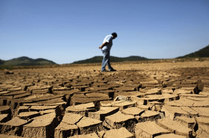About the University for SustainabilityThe University for Sustainability is co-creating the world’s largest education and research network concerned with education, research and innovation in and about sustainable development.
Mission: To accelerate a just and humanitarian transformation to global sustainable development with challenge-driven education, scientific research and innovation. With a world population of 7 billion people and limited natural resources, we need to learn to co-exist sustainably. We need to take action responsibly based on the understanding that what we do today can have implications on the lives of people and the planet in the future. The University seeks to empowers people to change the way they think and work towards a sustainable future. It aims to improve access to quality higher education on sustainable development at all levels and in all social contexts, to transform society by reorienting higher education and help people develop knowledge, skills, values and behaviours needed for sustainable development. The University scales and strengthens collective resources and collaborative infrastructure that enables member institutions to better serve their constituents and their regions. Through cooperation in education, research and outreach we enhance human capacity, promote viable communities and sustainable societies and economies, and forge global partnerships. See the Charter of The University for Sustainability here >>
 Sao Paulo Mega-drought Sao Paulo Mega-drought
For a number of identifiable reasons, the current path of world development is generating dangerous imbalances, inequities and environmental consequences. We face an array of interconnected global challenges on an unprecedented scale. And, if the path of development continues with a “business-as-usual” scenario it may leave little prospect for stability, prosperity and peace. Laurent Fabius, French Minister of Foreign Affairs and International Development said: “We are the first generation to know [about climate change], and probably the last to be able to act.” Recognizing that people are at the centre of sustainable development, UN Secretary-General Ban Ki-moon's "Synthesis Report," insists that “Education tops the global agenda for peace and stability and development in the world.” A strong education system broadens access to opportunities, improves health, and bolsters the resilience of communities. As the world has become increasingly complex and the challenges we face become more interconnected, so has the need for harnessing collective responses to complex solutions – solutions that affect and connect us individually, nationally, regionally and globally. However, as with many modern institutions, today's university is ill-equipped organizationally to address to the global challenges and at the pace necessary. The University for Sustainability's represents a new response. It is a platform for higher education to take action on sustainable development. Offering an unrivaled invitation for learners, scholars and researchers to pool their collective creativity, knowledge and experiences for realizing the future we need and the future we want, the University for Sustainability is a global network of higher education and research institutions. Through collaboration toward common goals, institutions of higher education can address some of the critical environmental and social problems the world faces while strengthening their own resilience to global challenges. To bring this about, the University for Sustainability is working with leading institutes around the world, as they themselves work to find solutions, and to educate and inspire future leaders, to address rapidly emerging economic, social and environmental realities. The University builds and strengthens collective resources and collaborative infrastructure, thereby enabling member institutions to better serve their constituents and their regions. Cooperation in education, research, outreach and engagement enhances human capacity, promotes viable communities and sustainable economies. The US is indicative of a new social contract that recognizes that we face a universal imperative for cross border research and educational collaboration. The University for Sustainability represents an exciting step towards a new model of global higher education, creating a distinct institutional structure that embraces the power of nodes and networks without losing local presence or identity. It is an effort by member universities to align complementary strengths and assets to provide truly global joint academic and research offerings addressing the field of sustainable development. The University builds and strengthens collective resources and collaborative infrastructure that enables member institutions to better serve their constituents. It is a cooperative network of universities, colleges, research institutes and other organizations concerned with education and research addressing sustainable development. Through cooperation in education, research and outreach we enhance and promote viable communities and sustainable economies, and forge global partnerships. Fostering research collaboration, joint educational programs and student and faculty mobility, its main goal is to increase access to sustainability-themed educational programs by increasing mobility and capacity. While the individual elements of US are not unique, the emergent properties that obtain from the whole offers remarkable opportunities. Among those parts, US has an undergraduate education component -- a series of sustainable development studies courses offered by faculty at various US institutions and open to students at any member institute within the network. The University for Sustainability manages a mobility program, which shall annually send students on funded exchanges throughout the network. And it lends its imprimatur to “thematic networks” and institutes, which are both meant to promote research and teaching collaboration across US member institutions on such themes such as:
Each of the thematic network shall be comprised of experts from at least three US institutions with funding from grants enabled by US. The thematic networks are very important because in some of the disciplines you don’t find this kind of systemic orientation. US shall create both an institutional network and a person-to-person network that exists nowhere else. A challenge to which US is responding is that a relatively small number of institutions that have major resources while many of the smaller institutions don’t have the faculty and research resources to deal with the pressing problems in their domain. |
US at a Glance
|
Non-Discrimination Policy*
“All human beings are born free and equal in dignity and rights." These simple but powerful words are the first line of the Universal Declaration of Human Rights adopted by the United Nations in 1949. The declaration’s power has always depended on our collective will to uphold its noble aspirations.
The University for Sustainability does not discriminate on the basis of race, color, creed, national origin, gender, sexual orientation, age, or disability in any of its policies, procedures, or practices, in compliance with Title VI of the U.S. Civil Rights Act of 1964, Title IX of the Education Amendments of 1972, Section 504 of the Rehabilitation Act of 1973, the Age Discrimination Act of 1975, and Title II of the Americans with Disabilities Act of 1990. This non-discrimination policy covers admission and access to, and treatment and employment in, the University's programs and activities. The University recognizes its obligation to provide overall program accessibility for disabled persons.
Nothing in this policy shall abridge academic freedom or the University's mission. Prohibitions against discrimination and discriminatory harassment do not extend to actions, statements or written materials that are relevant and appropriately related to course subject matter or academic debate.
This policy governs the conduct of all University for Sustainability students, faculty, staff and visitors that occurs on the University’s facilities or in connection with University-sponsored programs. This policy also governs conduct by University students, faculty, staff and visitors that creates, contributes to, or continues a hostile work, educational, or living environment for a member or members of the University community.
_______________________________________________
* Approved by the Board of Directors on 10 November 2019.
“All human beings are born free and equal in dignity and rights." These simple but powerful words are the first line of the Universal Declaration of Human Rights adopted by the United Nations in 1949. The declaration’s power has always depended on our collective will to uphold its noble aspirations.
The University for Sustainability does not discriminate on the basis of race, color, creed, national origin, gender, sexual orientation, age, or disability in any of its policies, procedures, or practices, in compliance with Title VI of the U.S. Civil Rights Act of 1964, Title IX of the Education Amendments of 1972, Section 504 of the Rehabilitation Act of 1973, the Age Discrimination Act of 1975, and Title II of the Americans with Disabilities Act of 1990. This non-discrimination policy covers admission and access to, and treatment and employment in, the University's programs and activities. The University recognizes its obligation to provide overall program accessibility for disabled persons.
Nothing in this policy shall abridge academic freedom or the University's mission. Prohibitions against discrimination and discriminatory harassment do not extend to actions, statements or written materials that are relevant and appropriately related to course subject matter or academic debate.
This policy governs the conduct of all University for Sustainability students, faculty, staff and visitors that occurs on the University’s facilities or in connection with University-sponsored programs. This policy also governs conduct by University students, faculty, staff and visitors that creates, contributes to, or continues a hostile work, educational, or living environment for a member or members of the University community.
_______________________________________________
* Approved by the Board of Directors on 10 November 2019.
|
© 2018 University for Sustainability The University for Sustainability is a U.S. registered 501(c)(3) tax exempt organisation All Rights Reserved. Terms of Use | Privacy Policy
|
|

